- Home
- Frank Herbert
Children of Dune dc-3 Page 2
Children of Dune dc-3 Read online
Page 2
It was the religion of Muad’Dib which upset Stilgar most. Why did they make a god of Muad’Dib? Why deify a man known to be flesh? Muad’Dib’s Golden Elixir of Life had created a bureaucratic monster which sat astride human affairs. Government and religion united, and breaking a law became sin. A smell of blasphemy arose like smoke around any questioning of governmental edicts. The guilt of rebellion invoked hellfire and self-righteous judgments.
Yet it was men who created these governmental edicts.
Stilgar shook his head sadly, not seeing the attendants who had moved into the Royal Antechamber for their morning duties.
He fingered the crysknife at his waist, thinking of the past it symbolized, thinking that more than once he had sympathized with rebels whose abortive uprisings had been crushed by his own orders. Confusion washed through his mind and he wished he knew how to obliterate it, returning to the simplicities represented by the knife. But the universe would not turn backward. It was a great engine projected upon the grey void of nonexistence. His knife, if it brought the deaths of the twins, would only reverberate against that void, weaving new complexities to echo through human history, creating new surges of chaos, inviting humankind to attempt other forms of order and disorder.
Stilgar sighed, growing aware of the movements around him. Yes, these attendants represented a kind of order which was bound around Muad’Dib’s twins. They moved from one moment to the next, meeting whatever necessities occurred there. Best to emulate them, Stilgar told himself. Best meet what comes when it comes.
I am an attendant yet, he told himself. And my master is God the Merciful, the Compassionate. And he quoted to himself: “Surely, We have put on their necks fetters up to the chin, so their heads are raised; and We have put before them a barrier and behind them a barrier; and We have covered them, so they do not see.”
Thus was it written in the old Fremen religion.
Stilgar nodded to himself.
To see, to anticipate the next moment as Muad’Dib had done with his awesome visions of the future, added a counterforce to human affairs. It created new places for decisions. To be unfettered, yes, that might well indicate a whim of God. Another complexity beyond ordinary human reach.
Stilgar removed his hand from the knife. His fingers tingled with remembrance of it. But the blade which once had glistened in a sandworm’s gaping mouth remained in its sheath. Stilgar knew he would not draw this blade now to kill the twins. He had reached a decision. Better to retain that one old virtue which he still cherished: loyalty. Better the complexities one thought he knew than the complexities which defied understanding. Better the now than the future of a dream. The bitter taste in his mouth told Stilgar how empty and revolting some dreams could be.
No! No more dreams!
***
CHALLENGE: “Have you seen The Preacher?”
RESPONSE: “I have seen a sandworm.”
CHALLENGE: “What about that sandworm?”
RESPONSE: “It gives us the air we breathe.”
CHALLENGE: “Then why do we destroy its land?”
RESPONSE: “Because Shai-Hulud [sandworm deified] orders it.”
—RIDDLES OF ARRAKIS BY HARQ AL-ADA
As was the Fremen custom, the Atreides twins arose an hour before dawn. They yawned and stretched in secret unison in their adjoining chambers, feeling the activity of the cave-warren around them. They could hear attendants in the antechamber preparing breakfast, a simple gruel with dates and nuts blended in liquid skimmed from partially fermented spice. There were glowglobes in the antechamber and a soft yellow light entered through the open archways of the bedchambers. The twins dressed swiftly in the soft light, each hearing the other nearby. As they had agreed, they donned stillsuits against the desert’s parching winds.
Presently the royal pair met in the antechamber, noting the sudden stillness of the attendants. Leto, it was observed, wore a black-edged tan cape over his stillsuit’s grey slickness. His sister wore a green cape. The neck of each cape was held by a clasp in the form of an Atreides hawk—gold with red jewels for eyes.
Seeing this finery, Harah, who was one of Stilgar’s wives, said: “I see you have dressed to honor your grandmother.” Leto picked up his breakfast bowl before looking at Harah’s dark and wind-creased face. He shook his head. Then: “How do you know it’s not ourselves we honor?”
Harah met his taunting stare without flinching, said: “My eyes are just as blue as yours!”
Ghanima laughed aloud. Harah was always an adept at the Fremen challenge-game. In one sentence, she had said: “Don’t taunt me, boy. You may be royalty, but we both bear the stigma of melange-addiction—eyes without whites. What Fremen needs more finery or more honor than that?”
Leto smiled, shook his head ruefully. “Harah, my love, if you were but younger and not already Stilgar’s, I’d make you my own.”
Harah accepted the small victory easily, signaling the other attendants to continue preparing the chambers for this day’s important activities. “Eat your breakfasts,” she said. “You’ll need the energy today.”
“Then you agree that we’re not too fine for our grandmother?” Ghanima asked, speaking around a mouthful of gruel.
“Don’t fear her, Ghani,” Harah said.
Leto gulped a mouthful of gruel, sent a probing stare at Harah. The woman was infernally folk-wise, seeing through the game of finery so quickly. “Will she believe we fear her?” Leto asked.
“Like as not,” Harah said. “She was our Reverend Mother, remember. I know her ways.”
“How was Alia dressed?” Ghanima asked.
“I’ve not seen her.” Harah spoke shortly, turning away.
Leto and Ghanima exchanged a look of shared secrets, bent quickly to their breakfast. Presently they went out into the great central passage.
Ghanima spoke in one of the ancient languages they shared in genetic memory: “So today we have a grandmother.”
“It bothers Alia greatly,” Leto said.
“Who likes to give up such authority?” Ghanima asked.
Leto laughed softly, an oddly adult sound from flesh so young. “It’s more than that.”
“Will her mother’s eyes observe what we have observed?”
“And why not?” Leto asked.
“Yes… . That could be what Alia fears.”
“Who knows Abomination better than Abomination?” Leto asked.
“We could be wrong, you know,” Ghanima said.
“But we’re not.” And he quoted from the Bene Gesserit Azhar Book: “It is with reason and terrible experience that we call the pre-born Abomination. For who knows what lost and damned persona out of our evil past may take over the living flesh?”
“I know the history of it,” Ghanima said. “But if that’s true, why don’t we suffer from this inner assault?”
“Perhaps our parents stand guard within us,” Leto said.
“Then why not guardians for Alia as well?”
“I don’t know. It could be because one of her parents remains among the living. It could be simply that we are still young and strong. Perhaps when we’re older and more cynical …”
“We must take great care with this grandmother,” Ghanima said.
“And not discuss this Preacher who wanders our planet speaking heresy? ”
“You don’t really think he’s our father!”
“I make no judgment on it, but Alia fears him.”
Ghanima shook her head sharply. “I don’t believe this Abomination nonsense!”
“You’ve just as many memories as I have,” Leto said. “You can believe what you want to believe.”
“You think it’s because we haven’t dared the spice trance and Alia has,” Ghanima said.
“That’s exactly what I think.”
They fell silent, moving out into the flow of people in the central passage. It was cool in Sietch Tabr, but the stillsuits were warm and the twins kept their condenser hoods thrown back from their red hair.
Their faces betrayed the stamp of shared genes: generous mouths, widely set eyes of spice addict blue-on-blue.
Leto was first to note the approach of their Aunt Alia.
“Here she comes now,” he said, shifting to Atreides battle language as a warning.
Ghanima nodded to her aunt as Alia stopped in front of them, said: “A spoil of war greets her illustrious relative.” Using the same Chakobsa language, Ghanima emphasized the meaning of her own name—Spoil of War.
“You see, Beloved Aunt,” Leto said, “we prepare ourselves for today’s encounter with your mother.”
Alia, the one person in the teeming royal household who harbored not the faintest surprise at adult behavior from these children, glared from one to the other. Then: “Hold your tongues, both of you!”
Alia’s bronze hair was pulled back into two golden water rings. Her oval face held a frown, the wide mouth with its downturned hint of self-indulgence was held in a tight line. Worry wrinkles fanned the corners of her blue-on-blue eyes.
“I’ve warned both of you how to behave today,” Alia said. “You know the reasons as well as I.”
“We know your reasons, but you may not know ours,” Ghanima said.
“Ghani!” Alia growled.
Leto glared at his aunt, said: “Today of all days, we will not pretend to be simpering infants!”
“No one wants you to simper,” Alia said. “But we think it unwise for you to provoke dangerous thoughts in my mother. Irulan agrees with me. Who knows what role the Lady Jessica will choose? She is, after all, Bene Gesserit.”
Leto shook his head, wondering: Why does Alia not see what we suspect? Is she too far gone? And he made special note of the subtle gene-markers on Alia’s face which betrayed the presence of her maternal grandfather. The Baron Vladimir Harkonnen had not been a pleasant person. At this observation, Leto felt the vague stirrings of his own disquiet, thinking: My own ancestor, too.
He said: “The Lady Jessica was trained to rule.”
Ghanima nodded. “Why does she choose this time to come back?”
Alia scowled. Then: “Is it possible she merely wants to see her grandchildren? ”
Ghanima thought: That’s what you hope, my dear aunt. But it’s damned well not likely.
“She cannot rule here,” Alia said. “She has Caladan. That should be enough.”
Ghanima spoke placatingly: “When our father went into the desert to die, he left you as Regent. He …”
“Have you any complaint?” Alia demanded.
“It was a reasonable choice,” Leto said, following his sister’s lead. “You were the one person who knew what it was like to be born as we were born.”
“It’s rumored that my mother has returned to the Sisterhood,” Alia said, “and you both know what the Bene Gesserit think about… .”
“Abomination,” Leto said.
“Yes!” Alia bit the word off.
“Once a witch, always a witch—so it’s said,” Ghanima said.
Sister, you play a dangerous game, Leto thought, but he followed her lead, saying: “Our grandmother was a woman of greater simplicity than others of her kind. You share her memories, Alia; surely you must know what to expect.”
“Simplicity!” Alia said, shaking her head, looking around her at the thronged passage, then back to the twins. “If my mother were less complex, neither of you would be here—nor I. I would have been her firstborn and none of this… .” A shrug, half shudder, moved her shoulders. “I warn you two, be very careful what you do today.” Alia looked up. “Here comes my guard.”
“And you still don’t think it safe for us to accompany you to the spaceport? ” Leto asked.
“Wait here,” Alia said. “I’ll bring her back.”
Leto exchanged a look with his sister, said: “You’ve told us many times that the memories we hold from those who’ve passed before us lack a certain usefulness until we’ve experienced enough with our own flesh to make them reality. My sister and I believe this. We anticipate dangerous changes with the arrival of our grandmother.”
“Don’t stop believing that,” Alia said. She turned away to be enclosed by her guards and they moved swiftly down the passage toward the State Entrance where ornithopters awaited them.
Ghanima wiped a tear from her right eye.
“Water for the dead?” Leto whispered, taking his sister’s arm.
Ghanima drew in a deep, sighing breath, thinking of how she had observed her aunt, using the way she knew best from her own accumulation of ancestral experiences. “Spice trance did it?” she asked, knowing what Leto would say.
“Do you have a better suggestion?”
“For the sake of argument, why didn’t our father … or even our grandmother succumb?”
He studied her a moment. Then: “You know the answer as well as I do. They had secure personalities by the time they came to Arrakis. The spice trance—well …” He shrugged. “They weren’t born into this world already possessed of their ancestors. Alia, though …”
“Why didn’t she believe the Bene Gesserit warnings?” Ghanima chewed her lower lip. “Alia had the same information to draw upon that we do.”
“They already were calling her Abomination,” Leto said. “Don’t you find it tempting to find out if you’re stronger than all of those …”
“No, I don’t!” Ghanima looked away from her brother’s probing stare, shuddered. She had only to consult her genetic memories and the Sisterhood’s warnings took on vivid shape. The pre-born observably tended to become adults of nasty habits. And the likely cause … Again she shuddered.
“Pity we don’t have a few pre-born in our ancestry,” Leto said.
“Perhaps we do.”
“But we’d … Ahh, yes, the old unanswered question: Do we really have open access to every ancestor’s total file of experiences?”
From his own inner turmoil, Leto knew how this conversation must be disturbing his sister. They’d considered this question many times, always without conclusion. He said: “We must delay and delay and delay every time she urges the trance upon us. Extreme caution with a spice overdose; that’s our best course.”
“An overdose would have to be pretty large,” Ghanima said.
“Our tolerance is probably high,” he agreed. “Look how much Alia requires. ”
“I pity her,” Ghanima said. “The lure of it must’ve been subtle and insidious, creeping up on her until …”
“She’s a victim, yes,” Leto said. “Abomination.”
“We could be wrong.”
“True.”
“I always wonder,” Ghanima mused, “if the next ancestral memory I seek will be the one which …”
“The past is no farther away than your pillow,” Leto said.
“We must make the opportunity to discuss this with our grandmother. ”
“So her memory within me urges,” Leto said.
Ghanima met his gaze. Then: “Too much knowledge never makes for simple decisions.”
***
The sietch at the desert’s rim
Was Liet’s, was Kynes’s,
Was Stilgar’s, was Muad’Dib’s
And, once more, was Stilgar’s.
The Naibs one by one sleep in the sand,
But the sietch endures.
—FROM A FREMEN SONG
Alia felt her heart pounding as she walked away from the twins. For a few pulsing seconds, she had felt herself near compulsion to stay with them and beg their help. What a foolish weakness! Memory of it sent a warning stillness through Alia. Would these twins dare practice prescience? The path which had engulfed their father must lure them—spice trance with its visions of the future wavering like gauze blown on a fickle wind.
Why cannot I see the future? Alia wondered. Much as I try, why does it elude me?
The twins must be made to try, she told herself. They could be lured into it. They had the curiosity of children and it was linked to memories which traversed millennia.
Just as I have, Alia thought.
Her guards opened the moisture seals at the State Entrance of the sietch, stood aside as she emerged onto the landing lip where the ornithopters waited. There was a wind from the desert blowing dust across the sky, but the day was bright. Emerging from the glowglobes of the sietch into the daylight sent her thoughts outward.
Why was the Lady Jessica returning at this moment? Had stories been carried to Caladan, stories of how the Regency was …
“We must hurry, My Lady,” one of her guards said, raising his voice above the wind sounds.
Alia allowed herself to be helped into her ornithopter and secured the safety harness, but her thoughts went leaping ahead.
Why now?
As the ornithopter’s wings dipped and the craft went skidding into the air, she felt the pomp and power of her position as physical things—but they were fragile, oh, how fragile!
Why now, when her plans were not completed?
The dust mists drifted, lifting, and she could see the bright sunlight upon the changing landscape of the planet: broad reaches of green vegetation where parched earth had once dominated.
Without a vision of the future, I could fail. Oh, what magic I could perform if only I could see as Paul saw! Not for me the bitterness which prescient visions brought.
A tormenting hunger shuddered through her and she wished she could put aside the power. Oh, to be as others were—blind in that safest of all blindnesses, living only the hypnoidal half-life into which birth-shock precipitated most humans. But no! She had been born an Atreides, victim of that eons-deep awareness inflicted by her mother’s spice addiction.
Why does my mother return today?
Gurney Halleck would be with her—ever the devoted servant, the hired killer of ugly mien, loyal and straightforward, a musician who played murder with a sliptip, or entertained with equal ease upon his nine-string baliset. Some said he’d become her mother’s lover. That would be a thing to ferret out; it might prove a most valuable leverage.

 Direct Descent
Direct Descent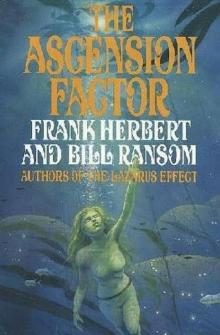 The Ascension Factor
The Ascension Factor The Heaven Makers
The Heaven Makers Children of Dune
Children of Dune Old Rambling House
Old Rambling House Dune
Dune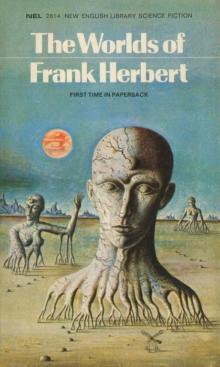 The Worlds of Frank Herbert
The Worlds of Frank Herbert The Jesus Incident
The Jesus Incident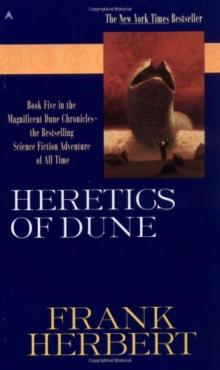 Heretics of Dune
Heretics of Dune Whipping Star
Whipping Star Dune Messiah
Dune Messiah Man of Two Worlds
Man of Two Worlds The Book of Frank Herbert
The Book of Frank Herbert Hunters Of Dune
Hunters Of Dune The Tactful Saboteur
The Tactful Saboteur Soul Catcher
Soul Catcher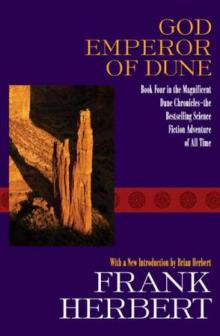 God Emperor of Dune
God Emperor of Dune The White Plague
The White Plague The Green Brain
The Green Brain The Godmakers
The Godmakers Sandworms of Dune
Sandworms of Dune Destination Void
Destination Void The Dosadi Experiment
The Dosadi Experiment Eye
Eye High-Opp
High-Opp The Eyes of Heisenberg
The Eyes of Heisenberg Missing Link
Missing Link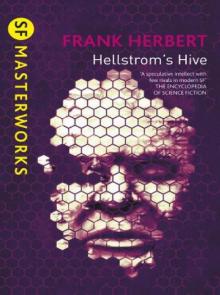 Hellstrom's Hive
Hellstrom's Hive Chapterhouse: Dune
Chapterhouse: Dune The Santaroga Barrier
The Santaroga Barrier The Dragon in the Sea
The Dragon in the Sea Operation Haystack
Operation Haystack A Thorn in the Bush
A Thorn in the Bush Four Unpublished Novels
Four Unpublished Novels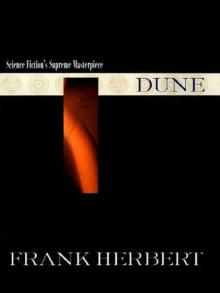 Dune dc-1
Dune dc-1 Jorj X. McKie 1 - Whipping Star
Jorj X. McKie 1 - Whipping Star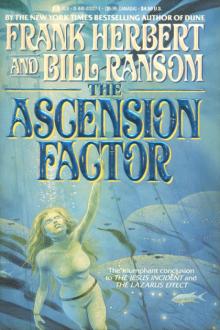 DV 4 - The Ascension Factor
DV 4 - The Ascension Factor Frank Herbert - Dune Book 4 - God Emperor Of Dune
Frank Herbert - Dune Book 4 - God Emperor Of Dune ChapterHouse: Dune dc-6
ChapterHouse: Dune dc-6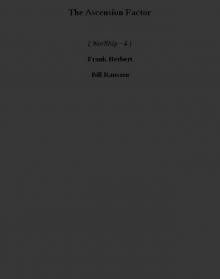 The Ascension Factor w-4
The Ascension Factor w-4 A Game of Authors
A Game of Authors Children of Dune dc-3
Children of Dune dc-3 Destination: Void: Prequel to the Pandora Sequence
Destination: Void: Prequel to the Pandora Sequence The Collected Stories of Frank Herbert
The Collected Stories of Frank Herbert Dune Messiah dc-2
Dune Messiah dc-2 Frank Herbert - Dune Book 5 - Heretics of Dune
Frank Herbert - Dune Book 5 - Heretics of Dune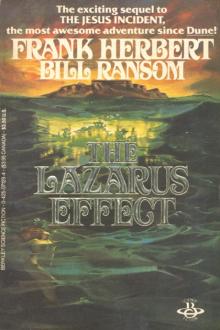 DV 3 - The Lazarus Effect
DV 3 - The Lazarus Effect The Jesus Incident w-2
The Jesus Incident w-2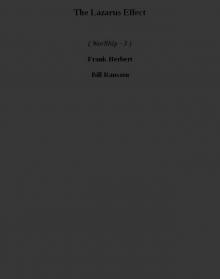 The Lazarus Effect w-3
The Lazarus Effect w-3 Frank Herbert
Frank Herbert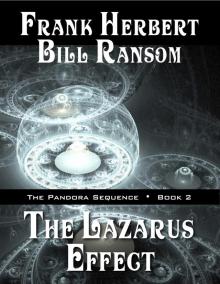 The Ascension Factor: Pandora Sequence
The Ascension Factor: Pandora Sequence Dune (40th Anniversary Edition)
Dune (40th Anniversary Edition) The Dosadi Experiment c-2
The Dosadi Experiment c-2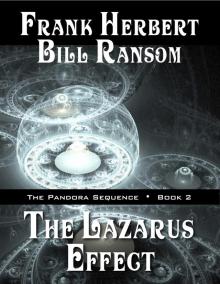 The Lazarus Effect
The Lazarus Effect God Emperor of Dune dc-4
God Emperor of Dune dc-4 The Pandora Sequence: The Jesus Incident, the Lazarus Effect, the Ascension Factor
The Pandora Sequence: The Jesus Incident, the Lazarus Effect, the Ascension Factor The Green Brain (v4.0)
The Green Brain (v4.0) The Heaven Makers (v4.0)
The Heaven Makers (v4.0) Heretics of Dune dc-5
Heretics of Dune dc-5